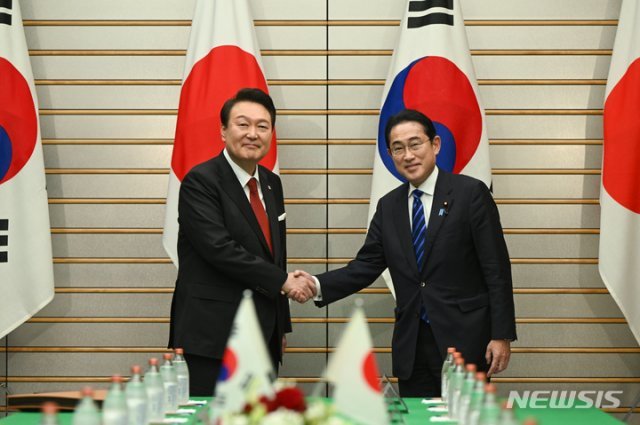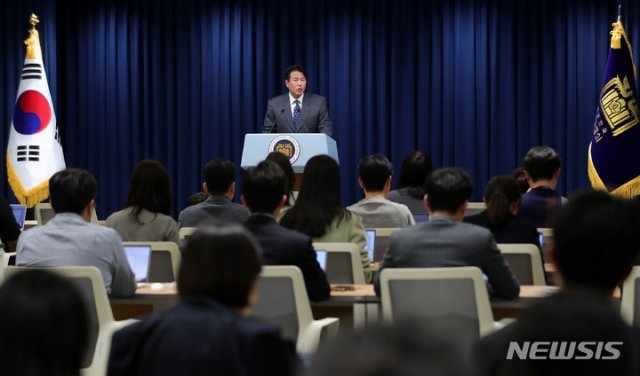Regarding Japanese media reports that ‘the comfort women and Dokdo issue were mentioned’ at the Korea-Japan summit, Kim Tae-hyo, first deputy director of the National Security Office, said, “We cannot disclose all the conversations between the leaders who came and went at the summit.”
On the 18th, Deputy Director Kim answered YTN’s ‘News Wide’ to the question, ‘Has (Prime Minister Kishida) requested that the comfort women agreement be fulfilled?
 President Yoon Seok-yeol and Japanese Prime Minister Fumio Kishida shake hands at an expanded Korea-Japan summit held at the Prime Minister’s Office in Tokyo on the 16th. 2023.03.16.
President Yoon Seok-yeol and Japanese Prime Minister Fumio Kishida shake hands at an expanded Korea-Japan summit held at the Prime Minister’s Office in Tokyo on the 16th. 2023.03.16.Deputy Director Kim said, “One of the parties to the comfort women agreement between Korea and Japan in 2015 was then Foreign Minister Kishida. And they read their reflection and apology as it is,” he explained, “exactly three years later, Korea disbanded the Reconciliation and Healing Foundation.”
In addition, he said, “(Compensation) of 10 billion won, 5.6 billion won remains, and the remaining money has already been paid to 35 out of 47 comfort women survivors at the time.” Therefore, there is no further action left for the two countries to take in the future.”
Next, Deputy General Manager Kim said, “Japan was surprised when the Korean government was trying to decide on a ‘third party reimbursement proposal’ as a solution to the forced labor issue. I don’t know if it will be okay in Korean domestic politics, but it seems to be the solution we have been longing for (he said).”
Previously, on the 17th, the presidential office announced that “at the Korea-Japan summit held yesterday (16th), neither the comfort women issue nor the Dokdo issue was discussed.”

In response to the question, “There are voices saying that it is impossible to seal the past and promote the future of Korea-Japan relations,” Deputy Director Kim said, “If you carefully examine the positions of those demonstrating on the street, they are claiming a position that the Japanese government will not accept.” “In other words, I have no choice but to conclude that it is better to continue neglecting the relationship between the two countries, which has served as a stumbling block for the past 12 years and has been in an uncomfortable relationship,” he said.
In addition, he said, “Even if you may be criticized right away, it would be nice to work together to communicate, explain, and understand what kind of fruit this can come.” I want to strongly oppose misinterpreting the issue, distorting the facts, or politicizing it.”
Deputy Director Kim responded to criticism that Japan did not properly express apology or reflection when Prime Minister Kishida mentioned that he “inherited the historical awareness of previous cabinets.” More than 20 times,” he emphasized.
He said, “I think it’s something to watch again if exchanges between the political world and civil society expand and trust builds up in the transition process, and if a more positive environment in domestic politics is created on the Japanese side.”
Lee Ye-ji,
Source: Donga
Mark Jones is a world traveler and journalist for News Rebeat. With a curious mind and a love of adventure, Mark brings a unique perspective to the latest global events and provides in-depth and thought-provoking coverage of the world at large.